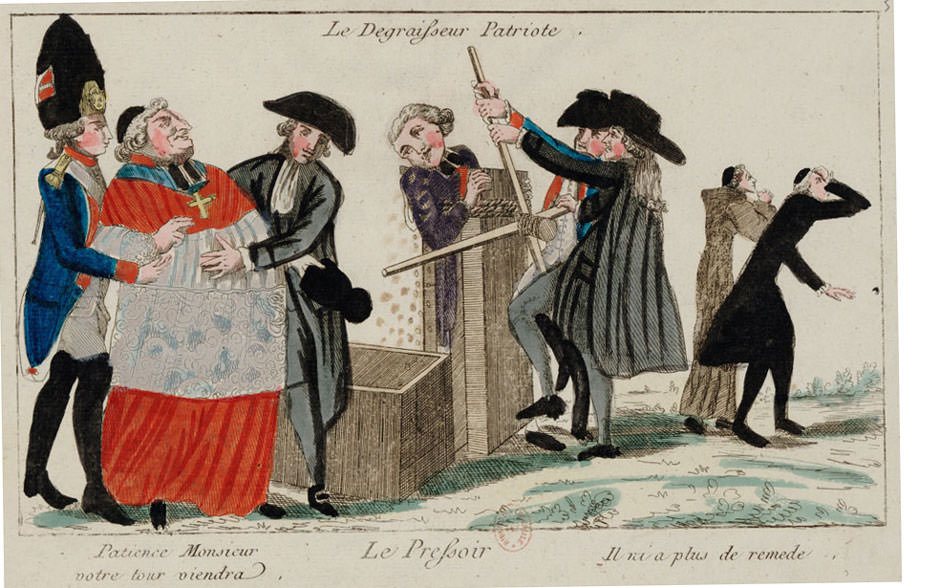One of the many cartoons published in homage to the cartoonists and journalists assassinated on Wednesday in the office of Charlie Hebdo showed a gravestone with the inscription “Died of Laughter.” No one is laughing these days in Paris. In fact, the massacre raises questions about laughter itself.
The French varieties come in many kinds, from the Rabelaisian belly laugh to the Voltairean smirk. Charlie Hebdo specialized in broad, free-swinging jokes, loaded with sex and in-your-face bad taste. In some ways, it seemed dated. Founded in 1970, it expressed the leftist mockery of the May-June 1968 rebellion. The Charlie it made fun of was Charles de Gaulle, although some saw a bit of Charlie Brown in the satire as well. Several of its famous cartoonists—Georges Wolinski, Jean Cabut, Philippe Honoré—were sixty-eighters now past seventy who never stopped cocking snoots at the high and mighty, until they were gunned down at the weekly editorial conference on January 7.
As a historian of French satire, I thought back over the writers who had aimed their wit against power and bigotry: Rabelais, Bussy-Rabutin, Beaumarchais, Chamfort…and above all, Voltaire. Outrageous satire flourished as far back as the 1640s, when Paul Scarron mocked Louis XIV’s chief minister, the Cardinal Mazarin, with these notorious lines:
Bougre bougrant, bougre bougré,
Et bougre au suprême degré….
[Buggering bugger, buggered bugger,
And buggered to the supreme degree….]
“We must get the laughter on our side,” Voltaire wrote, time after time, as he tried to mobilize his fellow philosophes in the campaign against persecution by the church.
There was nothing Voltairean in the humor of Charlie Hebdo, but its mockery of religious orthodoxy, among Christians as well as Muslims, expressed an anticlerical spirit that goes far back in French history. As the news of the massacre sank in, I kept thinking of Voltaire and calling up his famous grin—lips curled and lower jaw stuck out, as if to defy anyone who might dare to pull a punch.
It was not always an adequate defense. In his last years, Voltaire was overwhelmed with horror at atrocities committed by French courts, particularly the case of Jean Calas, a Protestant who was tortured and executed after being wrongly convicted for the suicide of his son, who had converted to Catholicism. The Calas Affair became the centerpiece in Voltaire’s campaign to crush l’infâme—intolerance, ignorance, injustice, and especially persecution perpetrated by the Church and state. At the height of his fury, if I remember correctly, Voltaire wrote a letter to d’Alembert, his main philosophic ally in Paris, stating, “This is not a time for laughter.”
Laughter against terror: an uneven match. On the day after the massacre, I asked a man who sells newspapers near my Paris apartment when he had sold his last Charlie Hebdo. “Within an hour of the event,” he said. He never kept many copies in his kiosk: “It had a peculiar kind of reader.” Would it survive? “Of course,” he said. “Otherwise, they would have won.” In fact, the survivors on the staff are already preparing next Wednesday’s editions from offices loaned to them by Libération. They will print a million copies.
I first heard about the massacre a few minutes after it occurred, when I happened to be sitting in the office of a friend who is an editor at Gallimard. He knew several contributors to Charlie Hebdo, and so did all his friends. The world of the printed word in Paris is small. Everyone in it knows someone who knows someone who was assassinated. Everyone is in a state of shock and feels the atrocity personally, as if it were a blow to the body—and also to the body politic, a blow against the press, against the free circulation of ideas, against the right to mockery. One commentator described it as an “attack against l’esprit français.”
Paris has been drained of laughter this week. Next week, the kiosks will be full of a resurrected Charlie Hebdo, but it is difficult to see when the human comedy will once again look funny.


